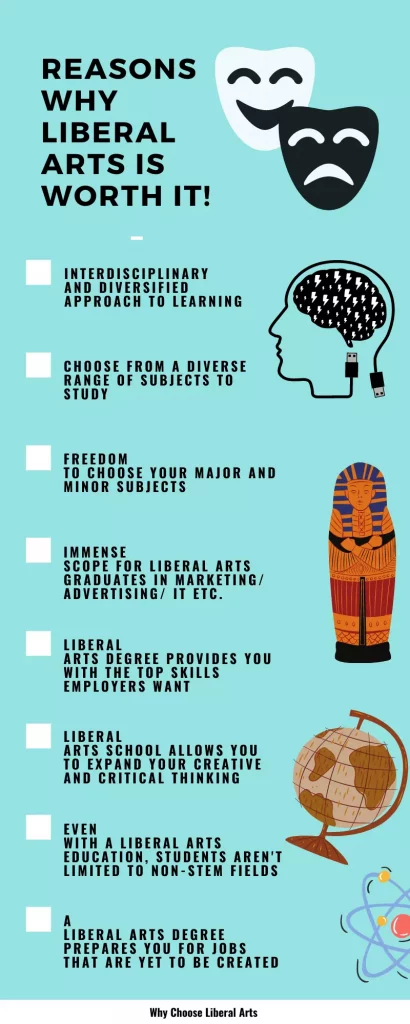Do you think there’s a lot more to explore than just studying and specializing in any subject? Do you also want to first learn and explore diverse fields of studies before majoring in one? If you are looking for a degree that can prepare you for a wide variety of fields, then you may want to know a tad bit more about liberal arts. The skills and knowledge you gain after studying liberal arts can advance your chances of succeeding in a career you are most passionate about.
Think of liberal arts as a holistic approach to education. It offers an expansive intellectual foundation across multiple academic disciplines. Just as important as the knowledge about these diverse fields is, students also gain skills that are highly relevant to the current job scenario.
A Liberal Arts education is spread across several fields which are crucial for an individual to develop logical and critical thinking; to understand issues that are vital for modern and future human societies and the world, to apply their mind to solve several social, economic, political, and environmental issues and problems.
Without further ado! Let’s get started…
Topics covered
Liberal arts meaning
Liberal Arts meaning is understood from the continuance of Ancient Greek methods of exploration and inquiry that started with a “desire for a universal understanding”. This field of arts furthered into more multiple complex areas of study & disciplines.
A Liberal Arts education is a traditional program that encompasses four major areas: social sciences, natural sciences, humanities, and arts. Students begin studying liberal arts right out of high school. This will help create a base for students to expand their knowledge and make their careers in different fields. When it comes to humanities studies, most colleges and universities usually provide students with courses such as Bachelor of Arts (BA) where students can choose minors and majors in humanities.
What is the scope of liberal arts?
The scope of liberal arts far exceeds the diversity and exposure that you may not always find in specialized education. Modern-day Liberal Arts is a broad and inter-disciplinary category that comprises multiple academic disciplines:
- Humanities: including art, literature, philosophy, linguistics, religion, ethics, modern foreign languages, music, theatre, speech, and classical languages;
- Social Sciences: including history, psychology, law, sociology, political science, gender studies, anthropology, economics, geography, and business informatics;
- Natural sciences: including physics, chemistry, biology, geography, earth sciences, astronomy, archaeology, zoology, etc;
- Mathematics, Computer Science, Environmental Studies, Music, Visual Art, Performing Arts, Public Affairs, Gender Studies, etc.
A degree in Liberal Arts offers numerous career options as you will be a well-rounded, effective communicator with excellent problem-solving skills. These are all the personality traits an employer looks for in ideal candidates which will higher your chances of acquiring your dream job.
Do you know what is common among Howard Schultz, CEO of Starbucks; Michael Eisner, Former Walt Disney Company CEO; Susan Wojcicki, CEO of YouTube, and many other famous leaders in the world? Well, all these famous CEOs are Liberal Arts graduates proving that a degree in arts is totally worth it!
Why study liberal arts?
There are several reasons to study liberal arts, including:
- Broadening your perspective: Liberal arts education provides a well-rounded approach to learning, exposing you to a variety of subjects such as literature, history, philosophy, art, and science. This broad exposure can help you develop a more nuanced understanding of the world, and help you become a more informed and engaged citizen.
- Developing critical thinking skills: Liberal arts courses often emphasize critical thinking, problem-solving, and analytical skills, which are highly valued by employers across many industries. These skills can help you navigate complex problems, communicate your ideas effectively, and make informed decisions.
- Enhancing your creativity: Liberal arts courses often encourage creative thinking and expression, which can help you develop your unique perspective and approach to problem-solving.
- Building a strong foundation: A liberal arts education provides a strong foundation for further study in a variety of fields. Whether you choose to pursue a graduate degree or enter the workforce, the skills and knowledge you gain from a liberal arts education can help you succeed in a wide range of careers.

8 Reasons Why Liberal Arts Education is Worth It!
The job market is rapidly changing and the skills that are most in demand in the future shall all be closely interlinked and inter connected with humanities and arts. Skills like critical thinking, problem solving, networking, and creative thinking and many other skills will be in high demand in the future of work.
Let’s take a look around some of the top reasons for taking up a degree in Arts:
Interdisciplinary and diversified approach to learning
Liberal Arts education is integrated with multiple areas of study. It exposes students to a wide and broad range of subject areas which trains the students to gain a broader perspective in whichever career path they choose. Students with such abilities can be of greater value to employers.
Highly interesting subjects to study
During undergraduate program in Liberal Arts, students will get to study extremely interesting and engaging subjects such as evolution of societies, mind and behaviour, fundamentals of natural sciences, philosophy, logic, legal studies, rhetoric, creative writing, environmental studies, and other subject areas to gain the right mindset and world view.
Freedom to choose subjects
Liberal Arts education gives you the freedom to build upon your interest in areas you are comfortable with. Students get to decide one or two or even three majors to develop specialized knowledge along with minors. Students also get to choose from various options in interdisciplinary majors and minors.
Immense scope for arts graduates
With state-of-the-art topics and exhaustive program curriculums, liberal arts students get exposed to a variety of fields. Students can get work opportunities in a wide range of fields such as Marketing & Advertising, human resources, IT or healthcare. Liberal arts graduates also make great business owners, managers, designers and teachers. Scope of liberal arts is high and will remain so in the upcoming years.
It provides you with soft skills employers want
By pursuing a degree in liberal arts, students gain skills that are highly valued and needed in industry such as effective communication, problem solving and critical thinking, analytical and observational skills, effective oral and written communication skills. These skills are highly relevant in the growing age of technology and will prepare students for the future of work.
Liberal Arts school allows you to expand your creative and critical thinking
With subjects ranging from humanities to social sciences and natural sciences to formal sciences, students get a wider perspective toward the human society and gain a world view before finalizing their specialized subjects. This allows them to exceed their creative and critical thinking skills making them more pragmatic and open minded.
Students aren’t limited to non-STEM fields
Students who wish to take up STEM related fields after a liberal arts degree can easily switch to a course of their choice as most STEM related courses like cyber security, information technology, data analytics, mathematics, physical therapy, nursing and many others let you pursue graduation in any subject.
A degree in Liberal Arts is a long-term investment in your career: A recent study by the National Center for Higher Education Management Systems showed that students with a liberal arts degree tend to earn slightly more after a few years of experience as compared to those who earn high at the starting of their careers holding a professional degree in management or other field.
A liberal arts degree prepares you for jobs that are yet to be created
According to a study by the World Economic Forum- The Future of Jobs, almost 65% of children who are in primary schools will end up in jobs that don’t even exist just yet. This means that the students ending up pursuing a liberal arts degree are more likely to gain the skills for the jobs that are yet to be created.
Arts degree prepares students for their first job, but also prepares them for future jobs that aren’t even created yet! So what are the skills that are going to help them survive in a world that is constantly changing? The core skills and abilities to think, create, adapt, and collaborate.
Top liberal arts courses
Liberal Arts is an interdisciplinary field of study that encompasses a wide range of subjects such as humanities, social sciences, natural sciences, and the arts. In India, several universities and colleges offer courses in liberal arts. Here is a list of some popular liberal arts courses in India along with their average course fees:
- Bachelor of Arts (BA) in Liberal Arts – Average Course Fee: INR 1,00,000 – 2,50,000 per year
- Bachelor of Liberal Studies (BLS) – Average Course Fee: INR 2,00,000 – 4,00,000 per year
- Bachelor of Arts (BA) in Humanities – Average Course Fee: INR 50,000 – 2,00,000 per year
- Bachelor of Science (BSc) in Liberal Arts and Sciences – Average Course Fee: INR 2,50,000 – 5,00,000 per year
- Bachelor of Arts (BA) in Social Sciences – Average Course Fee: INR 50,000 – 2,00,000 per year
- Bachelor of Fine Arts (BFA) in Liberal Arts – Average Course Fee: INR 1,50,000 – 3,00,000 per year
- Bachelor of Arts (BA) in Journalism and Mass Communication – Average Course Fee: INR 1,00,000 – 2,50,000 per year
- Bachelor of Arts (BA) in English Literature – Average Course Fee: INR 50,000 – 2,00,000 per year
- Bachelor of Arts (BA) in Psychology – Average Course Fee: INR 50,000 – 2,50,000 per year
To know about the colleges offering liberal arts courses, refer to our “Liberal Arts Colleges in India” blog post!
What skills will you learn?
Liberal art is a broad field that encompasses a range of academic disciplines, including literature, philosophy, history, art, languages, mathematics, social sciences, and natural sciences. As such, the skills required for success in liberal arts will depend on the specific area of study within this field. However, some general skills are useful for students pursuing a liberal arts education:
- Critical thinking: The ability to analyze and evaluate information and arguments is essential for success in liberal arts. Students should be able to question assumptions, identify biases, and draw logical conclusions from the evidence.
- Effective communication: Strong writing and verbal communication skills are essential for success in many liberal arts disciplines. Students should be able to express themselves clearly and persuasively in written and oral formats.
- Creativity: Liberal arts disciplines often require students to think creatively and come up with original ideas and interpretations. Students should be open to new and unconventional approaches to problem-solving.
- Research skills: Liberal arts disciplines require students to conduct research, evaluate sources, and synthesize information. Students should be able to use both primary and secondary sources effectively.
- Cultural competence: The ability to understand and appreciate different cultures is essential for success in liberal arts. Students should be able to engage with diverse perspectives and develop empathy for people from different backgrounds.
- Adaptability: Liberal arts disciplines often require students to work independently and be self-directed. Students should be able to manage their time effectively and be flexible in their approach to learning.
- Numeracy: Some liberal arts disciplines, such as economics or statistics, require students to have strong quantitative skills. Students should be comfortable working with numbers and be able to analyze data.
Is an Arts degree worth it in today’s High-Tech world?
- The above-listed skills and abilities are examples enough to describe the relevance of arts degrees in today’s world. The employability skills are the absolute need of the hour making liberal arts graduates highly valuable for the up and coming jobs of the future.
- After completing a Bachelor’s degree in Liberal Arts, you can either continue higher studies and enroll for a Master’s degree or for an integrated Master’s and Ph.D. program. You also have the option to go abroad for higher studies.
- Or you may also look for job opportunities as a Junior Analyst with consulting companies such as Ernst & Young, Deloitte, etc.
- You may also look for job opportunities Print media and television companies, or advertisement companies.
- Those who want to study Liberal Arts or Humanities may look forward to an encouraging future over next the 10-30 years horizon. With rapidly advancing technologies in robotics, machine learning, and artificial intelligence, many experts believe that automation would take over most of the routine office work and repetitive tasks and even analytical tasks that we do will simply disappear from the job market as companies will employ robotic automation and artificial intelligence to do these tasks.
- For humans, what will remain are the jobs that require higher-order thinking, creative thinking, and require emotional behavior. People with skills like complex reasoning, critical thinking, creative thinking and emotional intelligence will be still getting a good number of jobs. Liberal Arts education is one of the few educational streams which prepare people to build a good career in such a future.
- Moreover, the emerging new world order requires people with such state of the art skills to think, create, and transition into the world of advanced technologies. Hence people with education in Liberal Arts would benefit a lot.
Final words!
The job market is rapidly changing and the skills that are most in demand in the future shall all be closely interlinked and interconnected with humanities and arts. Skills like critical thinking, problem-solving, networking, creative thinking, and many others skills will be in high demand in the future of work.
By now you must have understood the meaning and scope of a Liberal Arts degree. And how a degree in this field could enable you to start a career in any field you wish to. And even if you haven’t figured it out yet, take help from someone who holds expert knowledge in such careers. You can get your queries resolved in just 60 seconds from our Career counselors. So, what are you waiting for? Download the iDreamCareer app now!
iDreamCareer always believes in helping young minds discover their true mettle. We try to help young confused minds from 9th class, 10th class, class 11, and class 12 to select their most-suited career choices.
Other interesting blogs you may wish to explore:
- How to Become a Freelancer? Top 5 Hacks
- Ultimate Guide: Scholarships to Study Abroad for Indian Students
- Complete Guide: Make a High-Earning Career with an Automobile Engineering Degree
- Humanities Courses: Scopes & More
- Career Options after 12th Humanities
- Top Skills for School Students
- Career Guidance after 12th
- Career in Liberal Arts
- Liberal Arts Subjects
- Liberal Arts Colleges in India
- Career Guidance program for admission in Liberal Arts

Anushree Rastogi is a Senior Content Writer at iDreamCareer, bringing over 5 years of expertise to the field of career counseling. She has done a PGDM in Marketing and Finance and possesses a unique blend of skills that allows her to craft engaging and informative content. She is passionate about helping individuals navigate their career paths and has dedicated her career to providing valuable insights through her content. Her commitment to excellence and keen understanding of the career landscape make her a trusted guide for those seeking professional direction. With a flair for clear and engaging writing, Anushree is on a mission to empower others to make informed and fulfilling career choices.



















